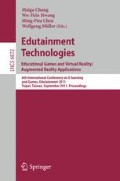Abstract
For many English learners, vocabulary learning is viewed as a burden. Digital game-based learning carries numerous potential to draw learners’ attention and help them learn information effectively. Many game-based learning systems claim to foster the learning process. However, not all the games are suitable for vocabulary learning. Our aim is to provide the selection criteria for teachers when they apply game-based vocabulary learning for teaching. In this study, we firstly collected the criteria on evaluating game-based vocabulary learning from the previous research. Sixty-six criteria are chosen and divided into four dimensions (teaching, game, society, and technology) and fourteen categories. Next, some criteria are selected from the sixty-six ones through English teachers. Finally the selected criteria are ranked and given the weight calculated by ROC (Rank Order Centroid) according to students’ preferences.
Access this chapter
Tax calculation will be finalised at checkout
Purchases are for personal use only
Preview
Unable to display preview. Download preview PDF.
References
Conati, C.: Merging Cognition and Affect in HCI: Probabilistic Assessment of User’s Emotions in Educational Games. J. Applied Artificial Intelligence (2002)
Beck, I.L., Mckeown, M.G., Perfetti, C.A.: Effects of Text Construction and Instructional Procedures for Teaching Word Meanings on Comprehension and Recall. J. Educational Psychology. 74, 506–521 (1982)
Carnine, D.W., Freschi, R., Kameenui, E.J.: Effects of Text Construction and Instructional Procedures for Teaching Word Meanings on Comprehension and Recall. Reading Research Quarterly 17, 367–388 (1982)
Stahl, S.: Differential Word Knowledge and Reading Comprehension. J. Reading Behaviour 15, 33–50 (1983)
Baker, I., Haynes, M.: Second Language Reading and Vocabulary Acquisition: American and Chinese Readers Learning from Lexical Familiarization in English Texts. In: Coady, J., Haynes, M., Huckin, T. (eds.), pp. 130–152. Ablex, Norwood (1993)
Laufer, B.: Second Language Learning Acquisition: The Lexical Plight in Second Language Reading. In: Coady, J., Huckin, T. (eds.). Cambridge University Press, Cambridge (1997)
Otto, S.K., Pusack, J.P.: Applying Instructional Technologies. Foreign Language Annals 23(5), 409–417 (1990)
Sasson, D.: End of the Year Vocabulary Games: Tips and Strategies for Creating Fun Word and Sentence Games. NESTA Futurelab: Literature Review in Games and Learning. (May 21, 2008)
Hung, H.C., Young, S.C.: Constructing the Game-Based Learning Environment on Handheld Devices to Facilitate English Vocabulary Learning. In: 10th IEEE International Conferences on Advanced Learning Technologies (2010)
Wood, J.: Can software support children’s vocabulary development? Language Learning & Technology 5(1), 166–201 (2001)
Cowan, J.: What are the essential features of a successful academic game? SAGSET Journal 4(2), 17–22 (1974)
Lu, Y.L.: The Corroborative Study on Taiwanese Cuisine and E-learning System. Project Report NSC92-2524-S-152-001 (2005) (in Chinese)
Hsieh, T.C., Tseng, F.C., Wu, M.Y.: A Study on the Vital Function Factors around Campus and the Implementation of the Platform (2010) (in Chinese)
Prensky, M.: Digital Game-Based Learning. McGraw-Hill, New York (2001)
Author information
Authors and Affiliations
Editor information
Editors and Affiliations
Rights and permissions
Copyright information
© 2011 Springer-Verlag Berlin Heidelberg
About this paper
Cite this paper
Chen, WF., Lo, JJ. (2011). The Evaluative Criteria of Computer-Based Vocabulary Learning Games. In: Chang, M., Hwang, WY., Chen, MP., Müller, W. (eds) Edutainment Technologies. Educational Games and Virtual Reality/Augmented Reality Applications. Edutainment 2011. Lecture Notes in Computer Science, vol 6872. Springer, Berlin, Heidelberg. https://doi.org/10.1007/978-3-642-23456-9_46
Download citation
DOI: https://doi.org/10.1007/978-3-642-23456-9_46
Publisher Name: Springer, Berlin, Heidelberg
Print ISBN: 978-3-642-23455-2
Online ISBN: 978-3-642-23456-9
eBook Packages: Computer ScienceComputer Science (R0)

